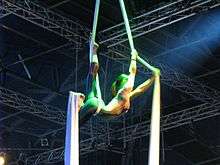Definify.com
Webster 1913 Edition
Silk
Silk
,Noun.
1.
The fine, soft thread produced by various species of caterpillars in forming the cocoons within which the worm is inclosed during the pupa state, especially that produced by the larvae of
Bombyx mori
. 2.
Hence, thread spun, or cloth woven, from the above-named material.
3.
That which resembles silk, as the filiform styles of the female flower of maize.
Raw silk
, silk as it is wound off from the cocoons, and before it is manufactured.
– Silk cotton
, a cottony substance enveloping the seeds of the silk-cotton tree.
– Silk-cotton tree
(Bot.)
, a name for several tropical trees of the genera
– Bombax
and Eriodendron
, and belonging to the order Bombaceae
. The trees grow to an immense size, and have their seeds enveloped in a cottony substance, which is used for stuffing cushions, but can not be spun. Silk flower
. (Bot.)
(a)
The silk tree
. (b)
A similar tree (
– Calliandra trinervia
) of Peru. Silk fowl
(Zool.)
, a breed of domestic fowls having silky plumage.
– Silk gland
(Zool.)
, a gland which secretes the material of silk, as in spider or a silkworm; a sericterium.
– Silk gown
, the distinctive robe of a barrister who has been appointed king's or queen's counsel; hence, the counsel himself. Such a one has precedence over mere barristers, who wear stuff gowns.
[Eng.]
– Silk grass
(Bot.)
, a kind of grass (
– Stipa comata
) of the Western United States, which has very long silky awns. The name is also sometimes given to various species of the genera Aqave
and Yucca
. Silk moth
(Zool.)
, the adult moth of any silkworm. See
– Silkworm
. Silk shag
, a coarse, rough-woven silk, like plush, but with a stiffer nap.
– Silk spider
(Zool.)
, a large spider (
– Nephila plumipes
), native of the Southern United States, remarkable for the large quantity of strong silk it produces and for the great disparity in the sizes of the sexes. Silk thrower
, Silk throwster
one who twists or spins silk, and prepares it for weaving.
Brande & C.
– Silk tree
(Bot.)
, an Asiatic leguminous tree (
– Albizzia Julibrissin
) with finely bipinnate leaves, and large flat pods; – so called because of the abundant long silky stamens of its blossoms. Also called silk flower
. Silk vessel
. (Zool.)
Same as
– Silk gland
, above. Virginia silk
(Bot.)
, a climbing plant (
Periploca Græca
) of the Milkweed family, having a silky tuft on the seeds. It is native in Southern Europe.Webster 1828 Edition
Silk
SILK
,Noun.
1.
The fine soft thread produced by the insect called silk-worm or bombyx. That which we ordinarily call silk, is a thread composed of several finer threads which the worm draws from its bowels, like the web of a spider, and with which the silk-worm envelopes itself, forming what is called a cocoon.2.
Cloth made of silk. In this sense, the word has a plural, silks, denoting different sort and varieties, as black silk, white silk, colored silks.3.
The filiform style of the female flower of maiz, which resembles real silk in fineness and softness. Virginia silk, a plant of the genus Periploca, which climbs and winds about other plants, trees, &c.SILK
,Adj.
Definition 2026
silk
silk
See also: Silk
English

A performer using silks
Noun
silk (plural silks)
- (uncountable) A fine fiber excreted by the silkworm or other arthropod (such as a spider).
- The silk thread was barely visible.
- A fine, soft cloth woven from silk fibers.
- I had a small square of silk, but it wasn't enough to make what I wanted.
- That which resembles silk, such as the filiform styles of the female flower of maize.
- The gown worn by a Senior (i.e. Queen's/King's) Counsel.
- (colloquial) A Senior (i.e. Queen's/King's) Counsel.
- (circus arts, in the plural) A pair of long silk sheets suspended in the air on which a performer performs tricks.
- (horse racing, chiefly in the plural) The garments worn by a jockey displaying the colors of the horse's owner.
Derived terms
Terms derived from silk
|
Translations
fiber
|
|
fabric
|
|
See also
Adjective
silk (not comparable)
- Made of silk.
- 1907, Robert W[illiam] Chambers, “chapter I”, in The Younger Set (Project Gutenberg; EBook #14852), New York, N.Y.: A. L. Burt Company, published 1 February 2005 (Project Gutenberg version), OCLC 4241346:
- It was flood-tide along Fifth Avenue; motor, brougham, and victoria swept by on the glittering current; pretty women glanced out from limousine and tonneau; young men of his own type, silk-hatted, frock-coated, the crooks of their walking sticks tucked up under their left arms, passed on the Park side.
-
- Looking like silk, silken.
- 1963, Margery Allingham, chapter 2, in The China Governess:
- Now that she had rested and had fed from the luncheon tray Mrs. Broome had just removed, she had reverted to her normal gaiety. She looked cool in a grey tailored cotton dress with a terracotta scarf and shoes and her hair a black silk helmet.
-
Verb
silk (third-person singular simple present silks, present participle silking, simple past and past participle silked)
- (transitive) To remove the silk from (corn).
- 2013, Lynetra T. Griffin, From Whence We Came (page 17)
- While we shucked and silked the corn, we talked, sang old nursery rhymes […]
- 2013, Lynetra T. Griffin, From Whence We Came (page 17)